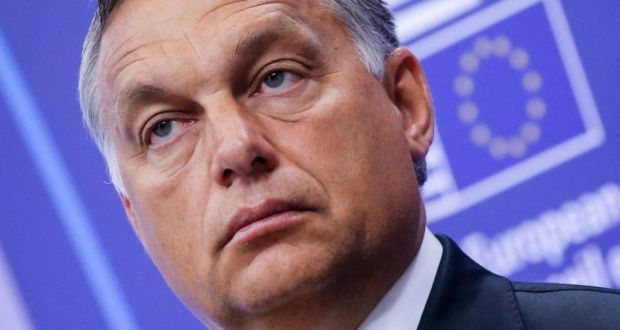Hungary has long styled itself as Europe’s black sheep, but in recent months, it has begun to look less like a misfit and more like a defector moving in slow motion.
The latest signal comes after last week’s meeting in the White House, when Budapest announced that it was negotiating a “financial shield” with the United States—a network of swap lines and financing arrangements designed to offset the billions in frozen EU funds withheld over rule-of-law breaches.
The optics are hard to miss. As Reuters speculates, the Hungarian government is effectively saying: if Brussels won’t bankroll us, Washington will. For a European Union that has spent years trying to discipline Viktor Orbán’s government over corruption, cronyism and its hollowing-out of democratic institutions, this is more than a financial story—it is a political rebuke.
Orbán has turned Hungary into a one-party state in all but name. The judiciary is tamed, the press obedient, the electoral map redrawn to ensure his Fidesz movement’s dominance. Billions in cohesion funds that were meant to modernise the Hungarian economy have instead lubricated the machinery of patronage. Transparency International now ranks Hungary among the most corrupt countries in the Union. And still, Orbán smirks his way through Brussels summits, confident that his veto power shields him from serious consequence.
Now he has a new card to play. If the EU cuts him off, he can point to American partnership as proof that he has other options. The irony is striking: a populist strongman who has spent years railing against “Western liberalism” is now using a deal with Washington to prove his independence from Brussels.
For Vladimir Putin, Hungary’s drift away from the European mainstream is more than a curiosity—it is a strategic gift. Since his invasion of Ukraine, the Kremlin’s overriding goal has been to fracture European unity. Military setbacks have made battlefield victories elusive, but political fissures inside the EU offer a subtler, longer-term triumph. Every time Orbán vetoes an EU package for Kyiv, questions the need for sanctions, or calls for “peace” on Russia’s terms, Putin can claim progress.
In Moscow’s eyes, Budapest has become a useful outpost: a NATO member that trades energy deals with Russia, an EU state that parrots Kremlin talking points about “Brussels diktats”, and now a government openly exploring financial lifelines outside the European fold. It fits neatly into the Kremlin’s broader narrative that Western solidarity is brittle, that liberal Europe cannot police its own ranks.
There is also the personal dimension. Putin and Orbán share an instinctive hostility to supranational governance and a common admiration for illiberal control. Both see the EU not as a community of values, but as an empire of bureaucracy. Orbán’s frequent flirtation with Trump—who himself has shown little sympathy for Brussels—only reinforces this triangular alignment. A Hungary that draws closer to Washington under a potential second Trump administration, while maintaining cordial ties with Moscow, would embody precisely the fragmentation Putin wishes upon the West.
Brussels, meanwhile, faces a grim dilemma. To expel a member state is virtually impossible under current treaties. To tolerate one that openly defies the Union’s core values, however, corrodes its credibility. The European Commission’s partial freeze on Hungarian funds was meant to signal seriousness about the rule of law. Yet Orbán’s ability to sidestep that pressure by courting foreign backers shows just how limited Brussels’ leverage really is.
The problem runs deeper than one government’s misconduct. It cuts to the heart of what the EU claims to be: a political and moral community based on shared democratic standards. If Hungary continues to dismantle those standards from within, and still enjoys the privileges of membership—access to markets, voting rights, and the aura of legitimacy—then the Union’s commitment to its own rules begins to look hollow.
That is why the question “Would the EU be better off without Hungary?” is no longer heretical. A decade ago, the idea of a member state drifting beyond the reach of European law would have been unthinkable. Today it feels almost inevitable. Hungary is already half-out in practical terms—closer to Moscow in energy, closer to Trumpian populism in tone, and further from Brussels in spirit than any other state in the bloc.
To lose Hungary as an active partner would be regrettable, but to retain it as a saboteur is worse. Each veto, each delay, each obstruction on sanctions or migration exposes the limits of EU solidarity. It sends the message that defiance pays, that the Union’s rules are negotiable, and that Europe lacks the will to defend its own cohesion.
Putin understands this perfectly. He does not need to reconquer Central Europe with tanks; he only needs to watch the EU undermine itself from within. Every time Orbán shrugs off Brussels’ reprimands, the Russian president can quietly toast another small victory. For him, Hungary’s estrangement is proof that his long game is working—that the centrifugal forces he set in motion years ago are finally bearing fruit.
The EU’s challenge, then, is not only to discipline one errant member, but to prove that its founding promise still has meaning. Europe’s future credibility depends on whether it can confront the cynical nationalism festering within its own borders. For now, Orbán, facing elections next year, seems content to play both sides – to court Washington and placating Moscow – while also provoking Brussels.
The question is whether Europe will let him. Because if it does, the Union won’t just lose Hungary’s loyalty. It will lose the moral authority that once made membership matter. The European Commission, however, is clearly not a major player in this game.
Orbán claims U.S. sanctions carve-out for Russian energy after White House talks
Click here for more News & Current Affairs at EU Today
__________________________________________________________________________________________________________________


